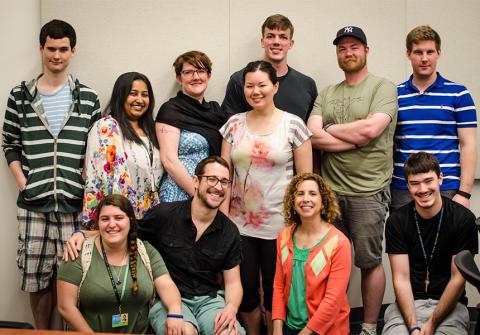Conservatory Graduate Student Brings Music Education to Autism Classrooms

As the population of individuals diagnosed with autism spectrum disorder continues to steadily expand, modern-day music educators are facing new challenges in the classroom.
Boston Conservatory at Berklee’s Master of Music in Music Education—with a Autism Concentration empowers educators to teach special needs students, offering a diverse array of training experiences, that range from hands-on classroom opportunities to innovative research activities. And this year, the Conservatory partnered with The Warren Prescott School—a pre-kindergarten through eighth grade public school in Charlestown, MA—to develop a comprehensive and engaging program for students on the autism spectrum. The program, which is funded by an EdVestors grant through the Boston Public Schools Arts Expansion, began in September 2015 and ran through June 2016.
Conservatory student Nadia Castagna (M.M.Ed. '17, autism concentration) was selected in September to spend time in each of the Warren Prescott School’s autism classrooms weekly.
“The music in my classroom goes further than just learning about how to read notes or sing,” she explains, “and includes practice in speech, motor movement, creativity, pitch matching and other positive skill-building.”
Castagna credits her education at the Conservatory for helping her prepare for this undertaking.
“The Boston Conservatory [at Berklee] has not only provided me with the proper information I need to teach but it has also provided me with hands-on training, up-to-date readings on autism education and opportunities to perform,” she says. “The density of the classes that we attend have an incredible amount of value to them. We are learning about cutting-edge information in the autism community, learning how to take what we know and apply it to teaching children on the spectrum and learning how to operate in an inclusive classroom. We learn how to take care of each individual child's needs, as well as the needs of the class as a whole.”
Castagna’s classroom activities vary depending on the age group. In her preschool and elementary class, students are focused on counting, speaking, interaction with peers, selfexpression, dynamics, listening, taking turns, body awareness, proprioception and motor movement along with learning songs and small instruments. The middle school group is working on those areas as well, but also learning to collaborate, sing, read music and play larger instruments like the piano.
Rhoda Bernard, chair of the Conservatory’s music education department and director of the program for students on the autism spectrum, explained that the partnership between the two schools began last spring. Warren Prescott proposed funding a music teacher from the Conservatory’s master's program to visit Warren Prescott once a week, teaching all four autism classes. The relationship, she says, is mutually advantageous for both institutions.
“The Conservatory benefits because one of our students gets hands-on experience teaching music to classes of students with autism every week, and The Warren Prescott School benefits because we provide them with an excellent music teacher who is specially trained for working effectively with this population.”
Bernard observed Castagna’s teaching twice this fall and was impressed by her work with children on the autism spectrum.
“In a very short time, Nadia has established herself as a valuable member of the school community, collaborating very effectively with her colleagues, both in music and in the autism team at the school,” Bernard says. “She meets with her colleagues every week to plan curriculum, share ideas, and discuss students and their needs. In her classes, Nadia creates an environment where students are safe and comfortable. She connects personally with each student, and she individualizes her approach to meet each student where he or she is.”
Castagna says the most rewarding aspect of her work at Warren Prescott is observing her students, who range from ages 3-14, grasping new information and enjoying doing so. Many of the students have made significant musical progress—some speaking or singing for the first time, pronouncing words more accurately, moving to the steady beat for the first time or simply becoming more outgoing with their peers. Castagna added that other teachers at Warren Prescott have been telling her that the highlight of the students’ week is music class.
“I believe music is important to those on the autism spectrum because it gives these individuals a voice, an outlet to express themselves and to experience joy,” explains Castagna. “Music reaches a place that nothing else seems to unlock—it really is magic.”
